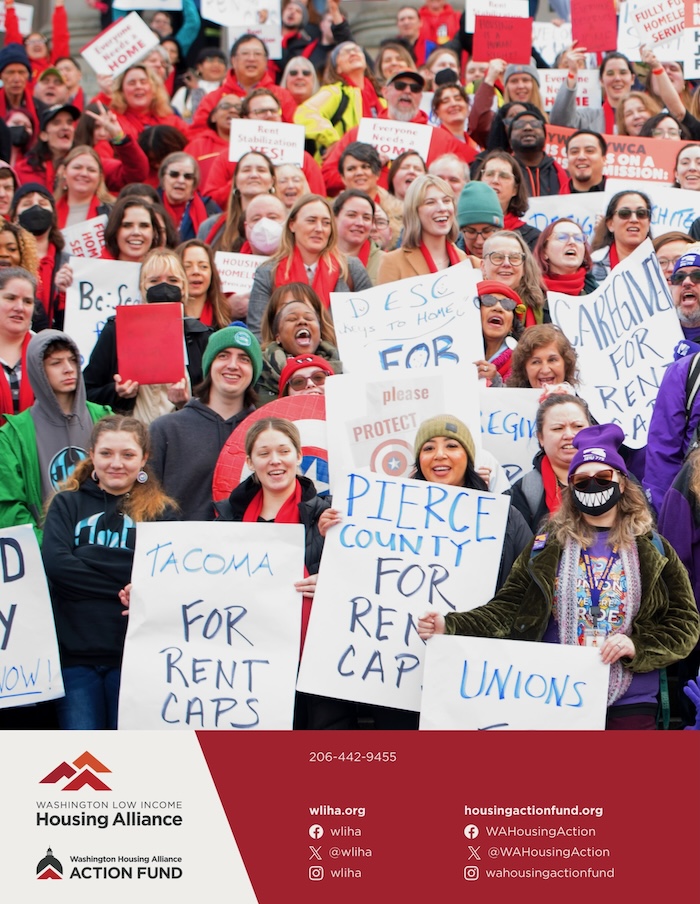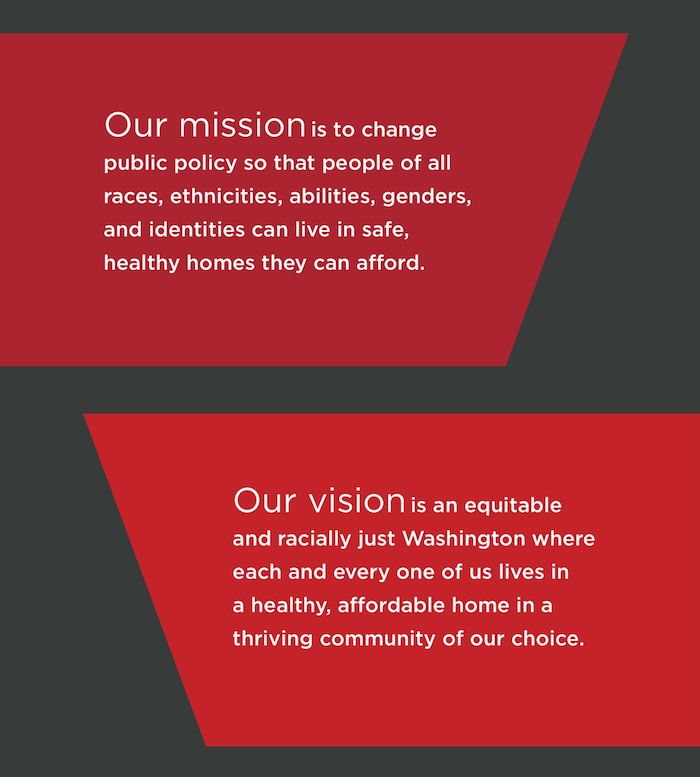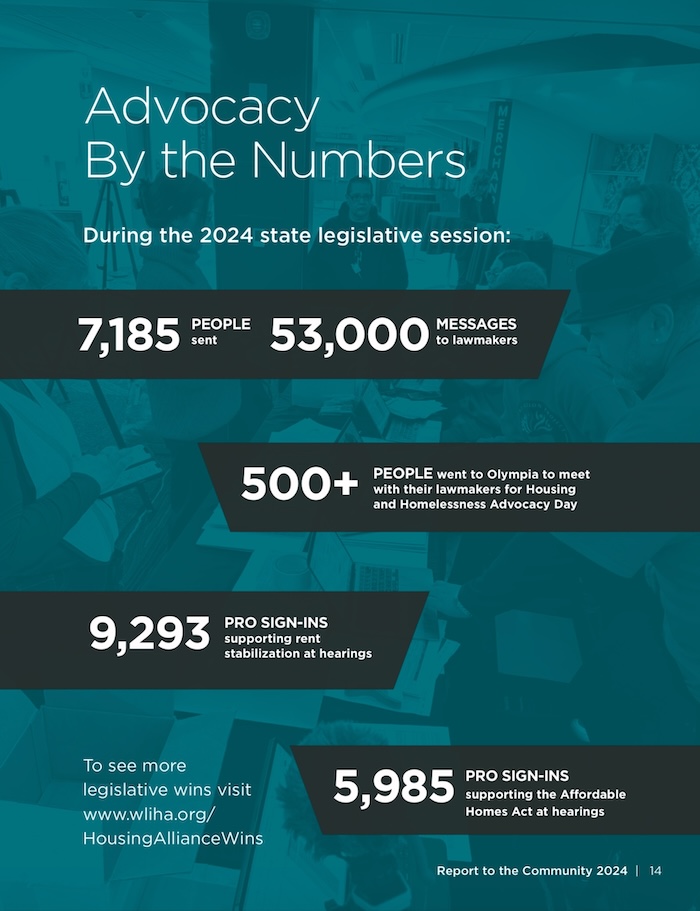You can read the Report in PDF format by clicking here.
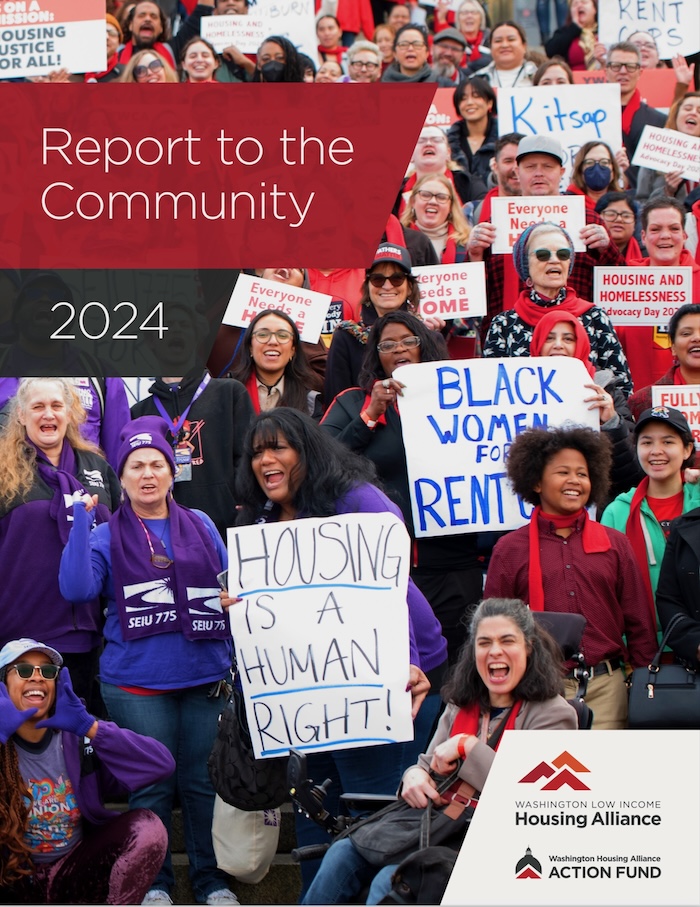

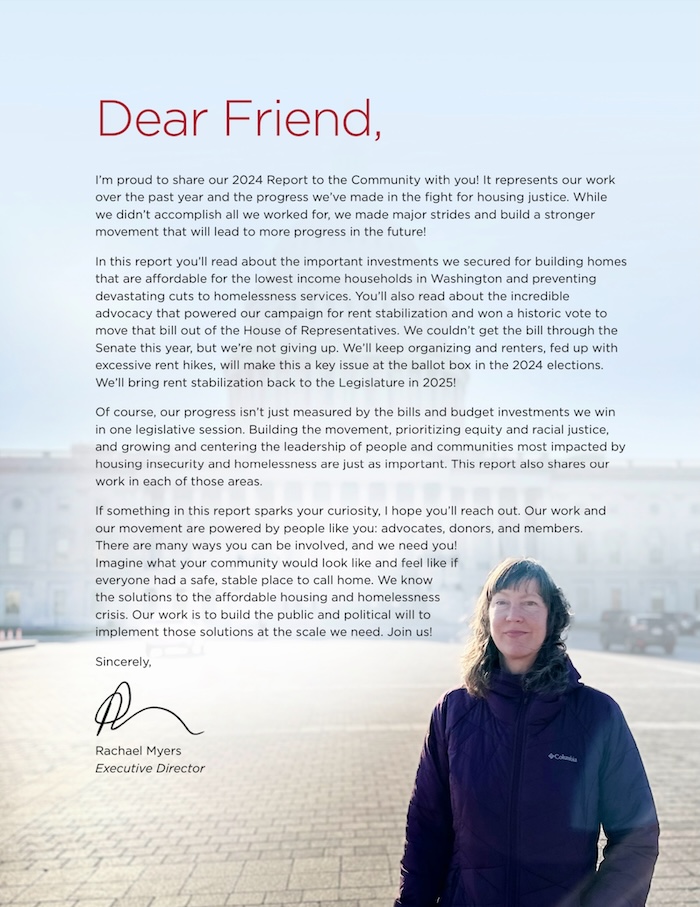
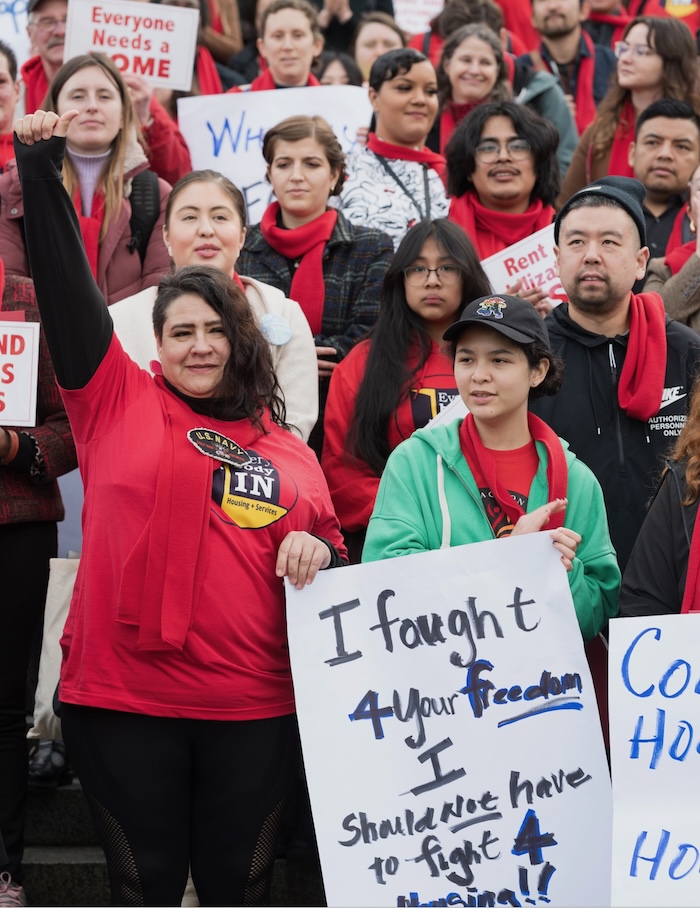
State of Housing and Homelessness in Washington
LIKE AIR TO BREATHE AND FOOD TO EAT, SAFE SHELTER IS A FUNDAMENTAL HUMAN NEED.
In recent years, thanks to strong advocacy and committed lawmakers, we’ve made great progress. The state has invested record amounts in homelessness services and affordable homes, adopted strong eviction prevention policies, expanded funding for rental assistance, and much more. But those investments and policies haven’t kept pace with rising housing costs. In Washington, a safe, stable home is still out of reach for many.
• In the next 20 years Washington needs 1.1 million more homes. Almost 650,000 will need to be affordable for low-income households.
• Almost 240,000 renter households in Washington are considered extremely low-income, earning less than 30% of the median income in the area where they live. But there are less than three affordable and available rental homes for every ten households at this income level.
• In 2023, a full-time wage of $36.33 per hour was needed to afford the average priced modest two-bedroom apartment in Washington. In King and Snohomish counties, that jumps to over $47 per hour. Because of these high rents, a full three quarters of the lowest income households pay more than half their income for rent, leaving very little left over for food, transportation, childcare, and other basic needs.
• Between May and October of 2023, nearly half a million people in Washington reported feeling pressure to move because of a rent increase and 28% of those were displaced by that increase.
• In 2023, there were more than 16,500 evictions filed in Washington — largely due to non-payment of rent. That’s up from 10,414 in 2022.

• The point in time count in January 2023 identified 28,036 people experiencing homelessness, a 12% increase over 2022. That includes people living unsheltered, sleeping in emergency shelters, or living in short-term transitional housing. Unsheltered homelessness increased 21% across the state, not including King County which did not conduct an unsheltered count in 2023.
• The Covenant Homeownership Program study released in April 2024 outlines significant racial disparities in homeownership and wealth for Blacks, Latinos, Native Americans, Alaska Natives, Native Hawaiians and other Pacific Islanders, and two Asian subgroups (Koreans and Asian Indians). It also acknowledges State government’s active and passive role in current and past discrimination that created these disparities. It finds that a race neutral approach is unlikely to address the problem, but a race conscious program could reduce the gap.
AS THE AFFORDABLE HOUSING AND HOMELESSNESS CRISIS GROWS, THE COMMUNITY-BASED ORGANIZATIONS DEDICATED TO HELPING PEOPLE ARE ALSO STRUGGLING.
• Homelessness service workers, especially those on the front lines, are frequently underpaid for jobs that require facing trauma and suffering every day. Homelessness organizations are struggling to hire and keep frontline staff – the very people we’re relying on to address the homelessness crisis.
• Many nonprofit and public housing providers are facing significant budget challenges stemming from skyrocketing insurance and other costs and the end of pandemic era rent assistance that ran out while many of their residents are still hurting from job losses and inflation.
The numbers represent a collection of individual experiences — our neighbors, friends, and family members who are impacted by affordable housing and homelessness crisis in Washington.
Roadmap to Housing Justice
AS DAUNTING AS THE CRISIS MAY SEEM, WE KNOW THE SOLUTIONS.
Last fall we released the Roadmap to Housing Justice; a call to action for lawmakers and a rallying point for our communities. It lays out the policy changes and investments needed to create housing justice in Washington.
The Roadmap is the product of many voices and dreams. It comes from years of advocacy for housing justice and deep listening. It is rooted in policy expertise, data, stories, lived experience, history, and principles of anti-racism and racial equity. The results reflect hundreds of conversations, survey responses, and listening sessions.
The Roadmap is organized into eight elements. Under each element, we lay out specific actions and necessary investments that will make Washington a place where everyone has a home.
1. Fund housing at the scale of need and urgently speed up affordable housing production. We’ve joined together and created the State Housing Trust Fund and raised significant funding to build housing. Now it’s time to fund and create housing at the scale of the needs across Washington.
2. Stabilize rents statewide for tenants and manufactured homeowners. Across our state, rents are skyrocketing. We need fair rules that will keep rents reasonable and predictable.
3. Create equitable access to homeownership and the wealth it can generate, for Black people, Indigenous people, and people of color. It’s time to heal the harms of the past and change the trajectory toward a racially just future. That means ending legacies of discrimination, repairing generational harm, and opening equitable access to homeownership for Black people, as well as Native American, Pacific Islander, Native Hawaiian, and Latino people, and others who have been systematically blocked from equitable home ownership opportunities.
4. Make rules and laws clear and fair so that tenants can have peace of mind, freedom to plan for the future, and safe, healthy homes. Most of us want to provide for our families, have a safe place to call home, and pursue our dreams, no matter what we look like or where we come from. But for renters, one rent increase or one unforeseen crisis can mean devastating loss. For people to be and stay well, both physically and mentally, for children to grow and elders to flourish, we need to ensure that everyone has housing they can count on.
5. Build a future of racial justice and social equity into housing policies, practices, and investments. Right now, access to safe, secure, stable housing is inequitable and discrimination is still commonplace. To create equity, we need to make investments that repair harm, build up institutions that are led by and for people who suffer housing injustice, and transform the conditions that keep things unequal. We can join together and change the trajectory toward an equitable future.
6. Pass policies and invest resources so that people can thrive in place, build lasting communities, and put down roots. People thrive when communities thrive. Everyone should be able to live in a neighborhood with good schools, grocery stores, parks, and libraries. But Black, Brown, and Indigenous communities face a brutal pattern of actions that break up communities and push people out. It is time to stop this destructive pattern and repair the harms of the past.
7. Protect people experiencing homelessness until everyone has a home. Far too many people are struggling to survive without basic human necessities. Until everyone has a home, we must care for and protect the basic needs and human rights of people in our communities who are without a home.
8. Prevent homelessness by taking care of our neighbors with good jobs, education, job training, access to health care, and support in hard times. Everyone goes through hard times. Facing a serious illness or injury, caring for a loved one, or needing treatment for mental health or substance use disorder are hard enough with a home. They should never be the cause of losing one.
Together, these changes are transformative. To win them will take power, persistence, and the voices and actions of all of us.
Learn more at wliha.org/roadmaptohousingjustice.

Progress in the 2024 Legislative Session
INVESTMENTS IN AFFORDABLE HOUSING AND HOMELESSNESS
The 2024 supplemental Capital Budget added $127 million to the Housing Trust Fund, bringing the two-year total to $527 million. This is the largest investment of state funds for building affordable homes since the Housing Trust Fund was created in 1986. This included approximately:
$20 million to address unsheltered homelessness
$19 million for housing for people with intellectual or developmental disabilities
$18 million for homeownership
$13.5 million to preserve manufactured housing communities
$40 million for specific affordable housing projects
$17 million for the Department of Commerce to award competitively
The Legislature also added $60 million to address the shortfall in fee collections that fund homelessness services in every county. This is an extraordinary investment in a supplemental budget and will prevent a loss of shelter and other services for people experiencing homelessness
MISSED OPPORTUNITIES
House Bill 2276, sponsored by Representative April Berg and Senate Bill 6191, sponsored by Senator Noel Frame, collectively known as The Affordable Homes Act, would have created a permanent and dedicated fund source for affordable housing by adding a modest 1% tax on properties that sell for more than $3.025 million.
House Bill 2114, sponsored by Representative Emily Alvarado and Senate Bill 5961, sponsored by Senator Yasmin Trudeau would have prevented landlords from issuing excessive rent increases. As 2114 passed the House it would have allowed landlords to increase rent on current tenancies up to 7% every 12 months, providing some stability for renters while still allowing landlords to keep up with costs and make a fair profit.
Housing justice in the News
Our work this year generated significant local and national news coverage!
We tracked more than 68 news stories across many media markets, including The New York Times, Associated Press, The Seattle Times, The Spokesman Review in Spokane, The Olympian, The News Tribune in Tacoma, the Yakima Herald-Republic, Axios, Newsweek, The Columbian in Vancouver, Crosscut, and most TV stations across Washington.
Much of the news coverage shared the experiences of renters who are being impacted by steep rent increases, who chose to step into advocacy and fight for change!
HIGHLIGHTS INCLUDED:
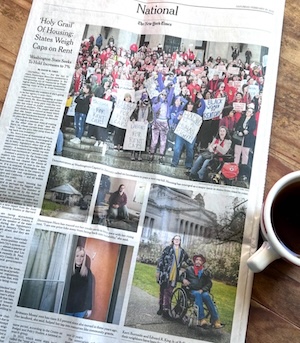 • The New York Times (Feb. 23, 2024) - A New ‘Holy Grail’ in the Housing Crisis: Statewide Rent Caps
• The New York Times (Feb. 23, 2024) - A New ‘Holy Grail’ in the Housing Crisis: Statewide Rent Caps
“I’m just in a constant state of waiting for the other shoe to drop,” said Ms. Horn, 42, whose current lease expires in May. “I am one price hike away from being back into instability.”
• KING TV in Seattle (Jan. 10, 2024) - Proposal would limit rent increases in Washington
Robin Zorich, a manufactured home owner who must pay rent for the site where her home sits in Woodland said without a cap from the state, she doesn’t know how long she and her husband will be able to afford their rent. “Now it’s getting scary. It’s trying to figure out all this stuff we have to cut out so we can just pay the rent.”
• KHQ TV in Spokane (Jan. 24, 2024) - ‘I have seen a rent increase every 90 days’: Washington lawmakers discuss rent stabilization
“In the last year I have seen a rent increase every 90 days,” Julie Sparkman, a Spokanite in support of the bill said. “So in the last 12 months my rent has gone up by a total of $560, and that ends up being like a 57% increase."
• KIRO TV (Feb. 12, 2024) - New bill could make significant difference for Washington renters
“This was our end game right here,” Boyd West, a manufactured home owner living in Kenmore told KIRO 7. “We thought we’d just stay here until we died and I don’t understand how that’ll be possible if the rent keeps going up like this.”
• HeraldNet (Feb. 17, 2024) - Editorial: Cap on rent can keep more people in their homes
Those who want to remain in their rental home or apartment either have to pay up when warned of an increase or start looking for something they can afford. That dilemma has been pushing more and more renters out of homes and often, out of the communities where their jobs and schools are close by.
• The Seattle Times (Feb. 21, 2024) - Editorial: Pass bill limiting rent hikes to help stabilize households
Frequent high rent increases each year have forced some tenants out of their homes, creating revolving doors in some neighborhoods, according to testimony. Excessive increases force families to frequently relocate. Such moves add to instability for students who have to switch schools.
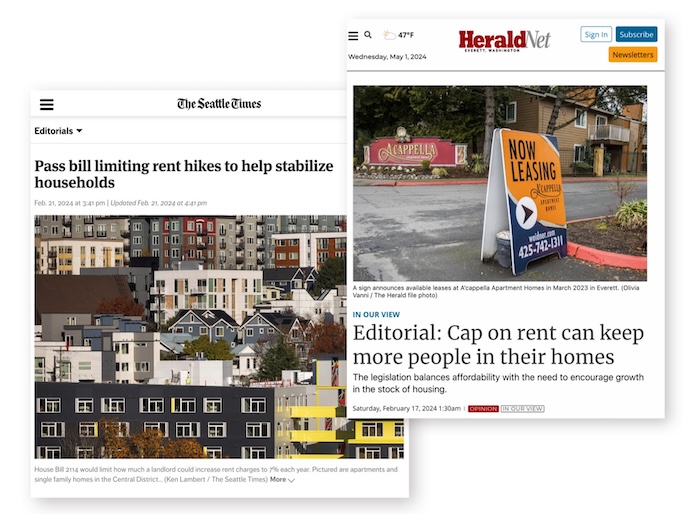
Truth to Power: Tenants Lead the Fight for Rent Stabilization
THE HOUSING ALLIANCE HAS LONG FOCUSED OUR ADVOCACY EFFORTS ON ADDRESSING THE UNDERLYING CAUSES TO OUR STATE’S AFFORDABLE HOUSING AND HOMELESSNESS CRISIS.
We lead the increasingly successful movement to address our massive shortage of affordable homes by increasing funding for the Housing Trust Fund and for preservation of already affordable homes. And we work each year to both protect dedicated funding for homelessness and increase state investments. But for each affordable home built, many people newly face housing instability and homelessness because rents continue to outpace what people can afford. We need basic, foundational corrections to stop people from experiencing the brutality of homelessness.
As renters across the state tell us, the rent is too high and the excessive yearly increases they are receiving are their biggest concern. And they are not alone. We have built a strong statewide movement of renters and allies calling for sensible, fair, and utterly necessary rent stabilization. Our ever-growing movement welcomed landlords, realtors, and local elected officials. But it is led, informed, and powered by impacted renters who have used their experiences of injustice to educate, organize, and build support for rent stabilization.
House Bill 2114/Alvarado and Senate Bill 5961/Trudeau were introduced this year to address the excessive and destabilizing rent increases that so many renter households across the state have faced. Impacted tenant leaders have shared their thoughts on what it means to be a leader of the movement, to testify, to speak to reporters, to educate lawmakers, and to share their fears of homelessness so publicly. We all have much to learn from people most impacted by the housing crisis. Read on to hear directly from folks who have bravely and strongly stood up for change.

![Deb Wilson of Aberdeen also lives in a manufactured housing community. She has testified countless times over the last two years for rent stabilization and has organized locally for protections and for community improvements. She shared that the impact of excessive rent increases has been devastating for her community, “A lot of people are skipping or reducing medication to get by. We have a pantry here that many more people need because of the rent increases. The toll on the safety net is great. People need to think about that. I’m hopeful for statewide rent stabilization and how close we came to passing the bill. This has made me want to try even harder. However, I’m concerned about the number of people who will face homelessness because it didn’t pass. I know for a fact that there are people in my community who can’t take another $100 increase. People literally die of stress from the fear of the increases. Older folks are really struggling.” She added that, “To win, we need to get rid of the lawmakers who oppose the bill, and elect people who support it.” Caroline Hardy lives in the same community in Aberdeen and is feeling hopeful about our ability to pass rent stabilization in 2025. She has organized closely with Deb and reiterates the need to elect lawmakers who pledge to support rent stabilization, “I made the trip to the state capitol to testify in person for the hearing in the Senate Ways & Means committee. To be welcomed by so many [before the hearing by lawmakers who met with advocates in the hall and after the hearing*] was very meaningful. It is clear that we need to elect more strong people in the senate, people who support us. And lawmakers who won’t lie.” When asked how it felt to be involved in this movement, Caroline shared, ‘”It is very important for people to share their stories. I’ve learned, that if you speak, people will listen. Testifying was intimidating, but after the first couple of times, I was humbled to be able to share what is going on. And the more of us that get up there and sp](/sites/default/files/inline-images/IMG_2798.jpeg)
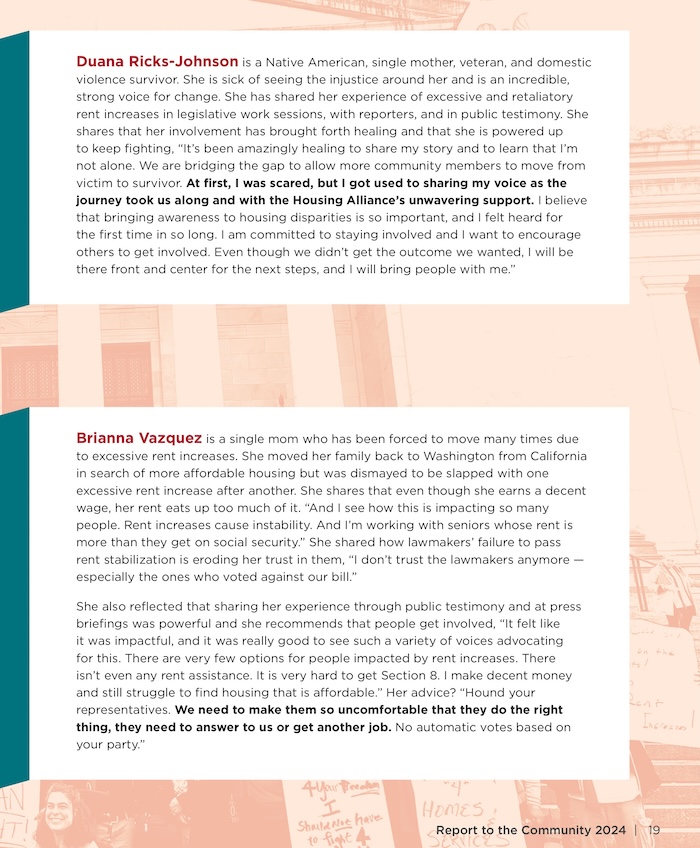

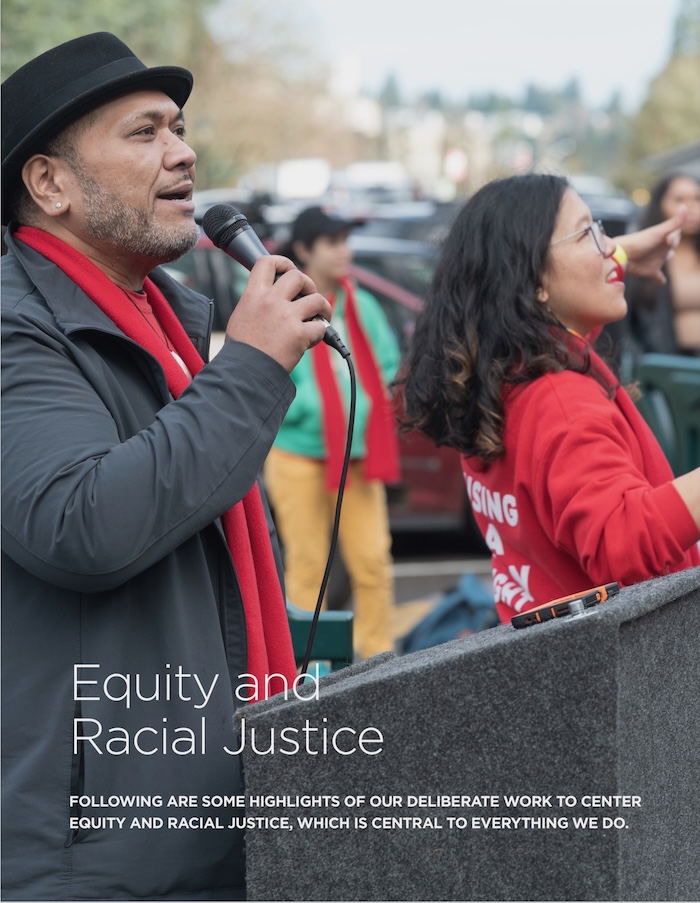
EQUITY & RACIAL JUSTICE BOARD COMMITTEE
Started in 2019, our board maintains an active committee focused on equity and racial justice that includes members of both the Housing Alliance and the Housing Action Fund boards. The committee meets monthly to provide strategic direction and oversight to the organization on equity and racial justice work. Over the last year, the committee has:
• Created equity commitments for board members to sign to ensure alignment of equity and racial justice values.
• Led the board in race-based caucusing, and conversations around dismantling white supremacy culture.
• Led board discussions and training about racial disparities in homeownership, homelessness, evictions, and other housing experiences.
• Reviewed and made recommendations about high level documents and policies including our Roadmap to Housing Justice, our compensation philosophy, and our organizational budget to ensure that there are sufficient resources to support this work, along with funds to compensate people who bring their lived expertise to our work.
If you are interested in learning more about this committee or in creating a similar committee for your organization, contact Ma.Caroline Lopez: macarolinel@wliha.org
RACIAL JUSTICE CAUCUSING
Holding “caucus” groups (aka: affinity groups) is a racial justice strategy that has proven to be an effective way to discuss, reflect, and take action toward anti-racism in a more open, connected, person, and healing centered forum. The Housing Alliance staff has been holding organizational monthly affinity spaces, specifically Black, Indigenous, and other people of color (BIPOC) and white caucus groups for a number of years. During our 2023 Conference on Ending Homelessness we convened multiple BIPOC, LGBTQIA2S+, white, and disability affinity spaces so that groups have time to connect, learn together, and debrief during the conference. Since 2020, as an offshoot from the conference, we have offered BIPOC monthly gathering spaces. In 2023, the joint boards’ Equity & Racial Justice Committee took the lead on establishing board affinity groups. We also followed up Lunch & Learn Actionshops with race-based caucusing to support continued discussion and education. If you are interested in attending upcoming affinity spaces, please contact, Ma.Caroline Lopez: macarolinel@wliha.org
COMMUNITY HEALING AND DEBRIEF SPACES
The legislative session can be emotionally heavy, with so much at stake. This is true for any advocate, housing and/or homelessness staff member, and it is especially true for people who have current or prior lived experience with housing instability or homelessness. People are taking actions to support systems change, repeating their story, editing it down to fit the allotted time, preparing to offer public testimony, while taking care of family and community, working possibly multiple jobs… and it can be retraumatizing. To offer a place of support and healing, we created community spaces each Friday of the 2023 and 2024 legislative sessions after our weekly legislative updates. These spaces include music, a grounding meditation, and an open and confidential space for people to debrief, witness one another, laugh, share, and offer gratitude and release as a transition into what we hope is a restful and joy filled weekend.
HOUSING TRUST FUND EQUITY COALITION
Since 2022, we’ve convened a coalition focused on how state Housing Trust Fund resources are allocated and how policy is set within the Department of Commerce. Last year the Coalition proposed changes to the membership of the Policy Advisory Team (PAT) — a stakeholder group that advises Commerce on Housing Trust Fund policy — to increase diversity around race, ethnicity, and lived experience. The proposal from the Coalition specifically requested a majority of Black and Indigenous as well as other people of color to be appointed to the advisory body to reflect the racial disparities in housing. In response to the Coalition’s advocacy, Commerce engaged an equity consultant to conduct racial equity training with PAT members and facilitate a process to determine future membership. In April 2024, the PAT began a nominating process and is transitioning into the “Community Advisory Team” (CAT) whose majority of members will come from communities most impacted by housing insecurity.
While the result and effectiveness of the new CAT are still to be seen, we’re hopeful that this change will result in better, more equitable outcomes for state housing resources. This process was led by a strong group of Black, Indigenous, and people of color leaders within the Coalition. We are grateful for their wisdom and advocacy toward tangible systems change! We also appreciate Housing Trust Fund staff and members of the Policy Advisory Team who dedicated significant time to a challenging but important process!
TRAININGS
We proudly launched our “Lunch & Learn: Equity, Racial Justice & Culture” series of actionshops in Fall 2022. The purpose is to connect our work of housing justice as non-profit organizations to the practices of using equity frameworks, anti-racism, and culture change. They are called “actionshops” as coined by one of our speakers Sidney Morgan, because participating in a webinar is just the beginning. Authentic change takes intentional action until it becomes second nature. Externally, these practices are meant to inform state policy, program implementation, and equitable distribution of housing resources. Internally, these practices are intended to inform non-profit operations and how we support and care for one another in affinity, in solidarity, and as people concerned with the thriving of humanity, spirit, and material access. Check out our 2023 lineup below and lookout for an invite to our 2024 series!
• Doing the (self-reflection) Work of Equity & Racial Justice - Ma.Caroline Lopez, MSW, Director of Equity, Racial Justice & Culture
• Developing our Critical Lenses: Exploring Patriarchy and Housing Justice - Ana Fabragas, MA
• What it means to be a pro-Indigenous organization, and how re-Indigenization supports wholeness from person to planet - Karyn Kameroff, MA, MSW, LICSWA, doctoral candidate
• How building a Pro-Black organization and movement liberates us all - Sidney Morgan, M.A.
• Advancing Racial Equity through Rent Stabilization in the 2024 Legislative Session - Michele Thomas, Director of Policy & Advocacy
SUPPORTING BIPOC-LED LOCAL ORGANIZING
In 2023, with the support of a key housing partner we were able to offer a handful of pass-through grants to support BIPOC-led local organizing for the legislative session. In 2024, we were able to offer a larger pass through grant to two of those organizations, leveling up our collective impact in Vancouver and Bellingham. In addition to increasing the capacity of two critical BIPOC -led partners, this has resulted in an ever-growing advocate base, a wider reach for policy education, great turnout from those communities for Housing and Homelessness Advocacy day, and on-the-ground actions including door-knocking for rent stabilization.
Program Highlights
RESIDENT ACTION PROJECT (RAP)
Resident Action Project is a statewide network led by people who live in affordable housing communities, or have experienced housing injustice, instability, or homelessness. RAP is building power to change policy through storytelling, organizing, and civic engagement.
In 2023 RAP held regional summits in Spokane, Kent, Vancouver, and Bellingham and held a town hall with state Senate majority leader Andy Billig in Spokane. RAP also conducted a workshop on the Housing Justice Narrative for approximately 70 people at the 2023 Conference on Ending Homelessness and trained 20 RAP leaders on the Narrative in December. RAP currently holds regular regional calls in Pierce & Thurston Counties, Whatcom & Skagit Counties, Spokane County, King County, and Clark & Cowlitz Counties and a quarterly call for RAP members across the state.
RAP leaders have also been guests on radio shows and podcasts including the Institute for Black Justice, sharing how directly-impacted people are leading the housing justice movement through sharing their personal stories, building community, and advocating together.
Nationally, RAP is a recurring guest in the National Low Income Housing Alliance’s Tenant Talk series, including an episode on the intersection of housing justice and disability justice coming this Spring. Last May RAP members traveled to Washington D.C. to meet with the Secretary of HUD about the criminalization of homelessness, building conditions, and tenants’ rights to organize without retaliation.
This March, RAP joined Community Change and resident organizing networks in Louisiana, Oregon, and California in receiving the National Low Income Housing Coalition’s Organizing Leader Award!
To learn more about RAP visit wliha.org/RAP or contact Duaa-Rahemaah Hunter at duaarahemaahh@wliha.org
CONFERENCE ON ENDING HOMELESSNESS
In 2023 we held our fourth fully-virtual Conference on Ending Homelessness (COEH), convening more than 700 people over three days to learn from each other, share ideas and best practices, and grow the movement to end homelessness in Washington and beyond. The conference included 39 breakout sessions and plenaries with over 75 speakers, plus caucus spaces for Black, Indigenous, and people of color, people with disabilities, LGBTQI2S+ people, frontline homeless service workers, and people who wanted to explore identities of privilege. Holding the event virtually once again was more accessible for many who would have otherwise had the additional time and expense of traveling across the state.
In 2024, we have decided to take a one-year pause on the conference. We know that many providers and advocates count on COEH as a training opportunity, and we want to ensure that a future conference is well-supported, sustainable, and fits with other training opportunities for homeless service organizations and providers in Washington. Options for future years might be the Housing Alliance continuing to host the conference and starting again in 2025, another host taking on the conference starting in 2025, or finding other ways to deliver training, recognizing that other opportunities also exist outside of COEH. We expect to finalize a decision midyear and plan to share that announcement widely.
HOUSING AND HOMELESSNESS ADVOCACY DAY (HHAD) RETURNS TO OLYMPIA!
For the first time in four years, housing justice advocates from across Washington were able to rally in Olympia during an in-person Housing and Homelessness Advocacy Day in late January 2024. More than 500 people gathered, learned, rallied, and made their voices heard in 105 lawmaker meetings during an action-packed day.
Advocates descended on Olympia from Bellingham, Spokane, Vancouver, and points in between. This included:
• Roughly 200 people with lived experience, including many Resident Action Project members, who registered for the event.
• Nearly 200 affordable housing and service providers who joined us on the capitol steps for the Rally for Homes.
The impact of HHAD attendees’ presence in Olympia was noted in statewide media coverage, and throughout the rest of the short legislative session many lawmakers mentioned the personal stories of rent increases and other hardships that they heard during HHAD.
Our Team
WE’RE PROUD TO HAVE HAD ZERO STAFF TURNOVER SINCE OUR REPORT LAST YEAR!
To learn more about what motivates our staff team, see our 2023 Report to the Community.
Board members provide leadership, wisdom, and community connections that help ensure our work is responsive to the ways homelessness and housing instability impact communities across the state.
WASHINGTON LOW INCOME HOUSING ALLIANCE BOARD
Paula Carvalho, President (Raikes Foundation)
Adria Buchanan, Vice President (Fair Housing Center of Washington)
Poppi Handy, Secretary (third place design co-op)
Karolynn Tom, Treasurer (Heritage University)
Mindy Woods, Resource Development Committee Chair (Resident Action Project)
Pam Duncan, Equity and Racial Justice Committee Chair (Community Volunteer)
Lisa Byers, Strategic planning Committee Chair (OPAL Community Land Trust)
Rep. Emily Alvarado (Enterprise Community Partners)
Isabel C. Garcia (Office of Rural and Farmworker Housing)
Jennifer Bereskin (Resident Action Project)
Rep. Julio Cortes (City of Everett)
Kresha Green (YWCA Seattle | King | Snohomish)
Leona Kaleikini-Torrez (Community Action Center)
Liz Trautman (Stand for Children Washington)
Mark Blatter (Community Volunteer)
Mercedes White Calf (Native America Youth and Family Center)
Nancy Nash-Mendez (Housing Authority of Okanogan County)
Peter Shapiro (Community Volunteer)
Sol Villarreal (Windermere Real Estate)
Titi White (Mary’s Place)
WASHINGTON HOUSING ALLIANCE ACTION FUND BOARD
Sheila Babb Anderson, President
Loren Tierney, Vice President
Kasey Burton, Secretary-Treasurer
Sharonne Navas, Endorsement Committee Co-Chair
Gary Akizuki, Endorsement Committee Co-Chair
Christena Coutsoubos
Irene Basloe Saraf
Jennifer Bereskin
Paula Sardinas
Peter Shapiro
Sesany Fennie-Jones
Terri Anderson
STAFF
Duaa-Rahemaah Hunter, Statewide Organizer
Gian Mitchell, Quest Fellow
Itzchel Bazan, Development and Events Manager
Kathy Lynn, Finance and Operations Manager
Ma.Caroline Lopez, Director of Equity, Racial Justice, and Culture
Megan Schaffer, Community Organizing Fellow, Resident Action Project
Michele Thomas, Director of Policy and Advocacy
Po Leapai, Advocacy Organizer
Rachael Myers, Executive Director
Rob Huff, Communications Specialist
Teresa Clark, Deputy Director
WE ARE THRILLED TO WELCOME SIX NEW BOARD MEMBERS WHO JOINED IN APRIL.
Each one brings talent, passion, and a deep commitment to housing justice. Together they will help ensure we have strong statewide representation and that our work is responsive to the needs of communities across Washington.
WASHINGTON LOW INCOME HOUSING ALLIANCE
Isabel Garcia, Office of Rural and Farmworker Housing
Nancy Nash-Méndez, Housing Authority of Okanogan County
Leona Kaleikini-Torrez, Community Action Center
Titi White, Mary’s Place
WASHINGTON HOUSING ALLIANCE ACTION FUND
Sesany Fennie-Jones, Vancouver
Irene Basloe Saraf, Seattle
IN ADDITION TO WELCOMING NEW MEMBERS, WE ARE ALSO GRATEFUL TO BOARD MEMBERS WHO ARE PASSING OR PICKING UP THE TORCH OF LEADERSHIP!
LEADERSHIP TRANSITIONS ON THE WASHINGTON LOW INCOME HOUSING ALLIANCE BOARD:
Our talented President since 2017, Liz Trautman, remains on the board but Paula Carvalho stepped into the President’s role. Adria Buchanan has become our Vice President. And Karolynn Tom is taking on the role of Treasurer following Mark Blatter’s leadership.
LEADERSHIP TRANSITIONS ON THE WASHINGTON HOUSING ALLIANCE ACTION FUND BOARD:
Loren Tierney stepped into the role of Vice President. Kasey Burton became our Secretary-Treasurer. And Gary Akizuki joined Sharonne Navas as CoChair of our Endorsement committee following Peter Shapiro’s leadership on that committee.
WE EXTEND OUR DEEP GRATITUDE TO BOARD MEMBERS WHO HAVE ENDED THEIR SERVICE IN THE LAST YEAR.
Kim Herman, founding member of the Housing Alliance and Housing Action Fund
Kim Toskey, long-time board member and friend of the Housing Alliance
Kylie Rolf, Housing Action Fund board and endorsement committee member
Bertrand “Mr. B” Harrell, founding member of the Resident Action Project
Lee Murdock, Director of the Yakima Homeless Network and longtime member of the Homelessness Advisory Committee
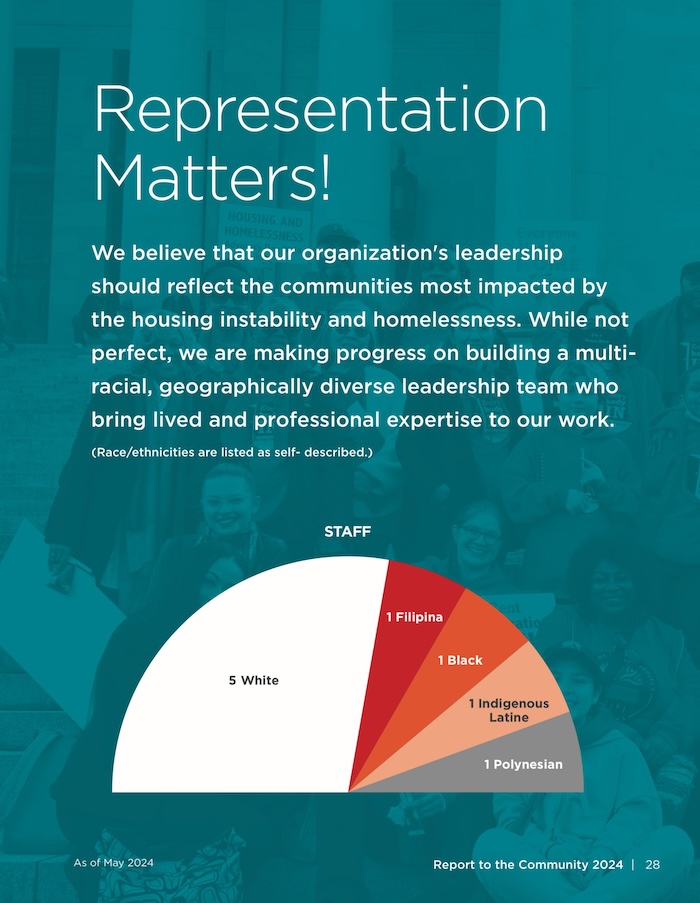
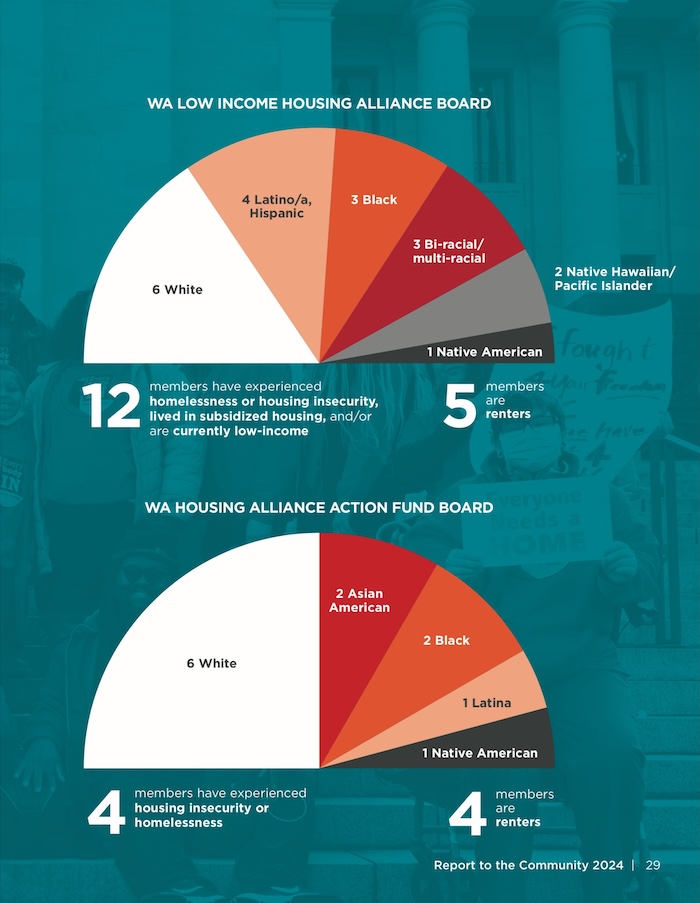
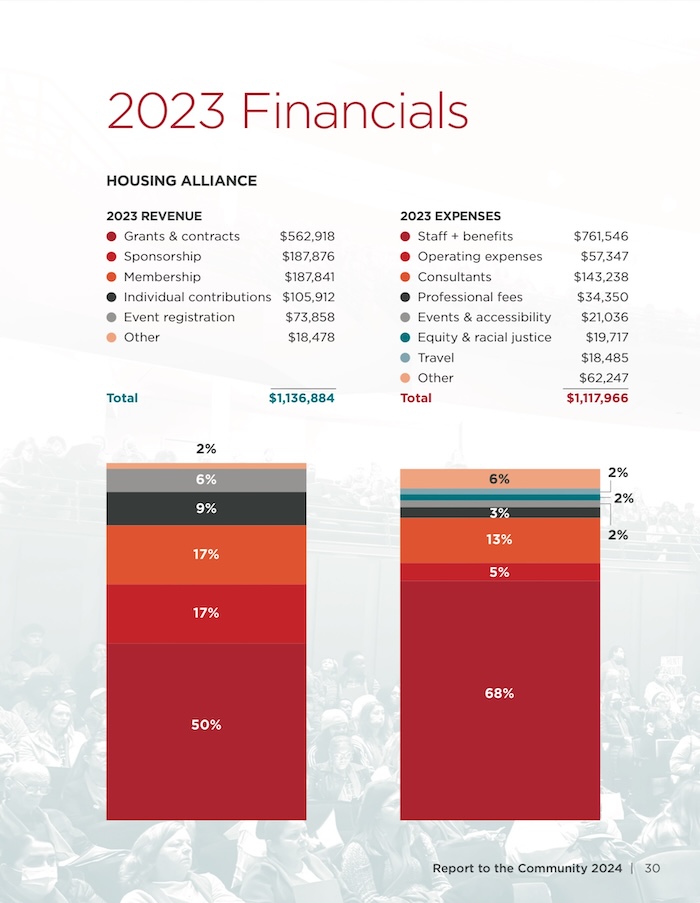
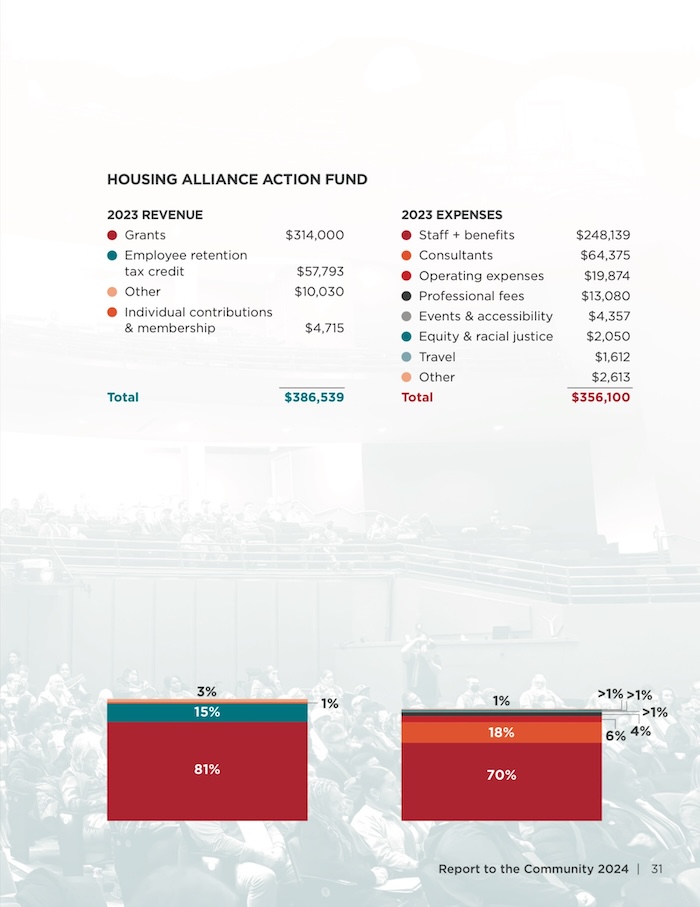
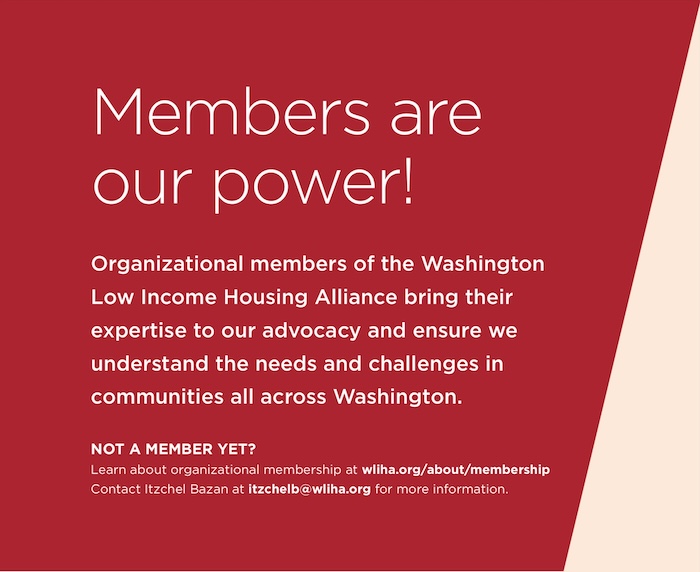
COUNTY HOMELESSNESS NETWORK MEMBERS
Benton County
Clark County
Blue Mountain Action Council
Franklin County
Island County
Olympic Community Action Project
King County
Kitsap County
Washington Gorge Action Programs
Okanogan Community Action Council
Pacific County
Family Crisis Network
Pierce County
Opportunity Council
Skagit County
Snohomish County
Thurston County
Walla Walla County
Whatcom County
Whitman Community Action Center
ORGANIZATIONAL MEMBERS
A Way Home Washington
All Saints Community Services
Association of Manufactured Homeowners
Bailey-Boushay House
Bellingham Tenants Union
Bellwether Housing
Bremerton Housing Authority
BRIDGE Housing Corporation
Carl Maxey Center
Cascades AIDS Project
Catholic Charities Housing Services
Catholic Charities of Eastern Washington
Catholic Charities: Central Washington
Chelan Douglas Community Action Council
Chelan Valley Hope
Chief Seattle Club
City of Olympia
City of Seattle Office of Housing
Cocoon House
Community Action Council of Lewis, Mason, & Thurston Counties
Community Action of Skagit County
Community Health Plan of Washington
Community Youth Services
Compass Housing Alliance
Corporation for Supportive Housing
Council for the Homeless
Dept of Commerce
Disability Rights Washington
Domestic Violence Services of Snohomish County
Elizabeth Gregory Home
Enterprise Community Partners
Evergreen Treatment
Family Support Center of South Sound
Friends of Youth
Frontier Behavioral Health
Goodwill Industries of the Inland NW
Habitat for Humanity Seattle King County
Homes and Hope Community Land Trust
Homes First
Homestead Community Land trust
Hopelink
Housing Authority of Grant County
Housing Authority of the City of Bellingham
Housing Authority of the City of Pasco & Franklin County
Housing Authority of the City of Tacoma
Housing Authority of Vancouver
Housing Authority of Whatcom County
Housing Development Consortium Seattle King County
Housing Initiative LLC
Housing Opportunities of SW WA
Housing Resources Bainbridge
Imagine Housing
Impact Capital
Inland Empire Residential Resources
Interim CDA
King County Dept. of Community and Human Services
King County Housing Authority
Kitsap Community Resources
Kitsap Mental Health Services
Kulshan Community Land Trust
Local Initiatives Support Corporation of Puget Sound
Lopez Community Land Trust
Low Income Housing Institute
Lower Columbia Community Action Council
Lydia Place
Mary’s Place
Mental Health Housing Foundation
Mercy Housing
Multi-Service Center
Muslim Housing Services
Neighborhood House
NeighborWorks of Grays Harbor County
Next Step Housing
Northwest Cooperative Development Center
Northwest Hospitality
Odyssey World International Education Services SW WA
Office of Rural & Farmworker Housing
Okanogan County Community Action Council
OPAL Community Land Trust
OPEIU Local 8
Parkview Services
Pioneer Human Services
Plymouth Housing Group
PorchLight
Puget Sound Advocates for
Retirement Action
REACH Community Development
Renton Housing Authority
Resolution to End Homelessness
Rural Community Assistance Corporation
San Juan Community Home Trust
Seattle Housing Authority
Seattle King County Coalition on Homelessness
SEED SouthEast Effective Development
Serenity House of Clallam County
Share Vancouver
Sophia Way
Southwest Washington Equity Coalition
St. Stephen Housing Association
Tacoma Urban League
The Arc of King County
UFCW 3000
United Way King County
Urban League of Metropolitan Seattle
Vision House
Volunteers of America Western Washington
Washington Community Reinvestment Association
Washington Kids in Transition
Washington State Coalition Against Domestic Violence
Washington State Community Action Partnership
Washington State Housing Finance Commission
Womens Resource Center
Yakima Neighborhood Health Services
YWCA Seattle | King | Snohomish
Whether you are a member, donor, advocate, or all of the above,
you are part of a powerful movement!
